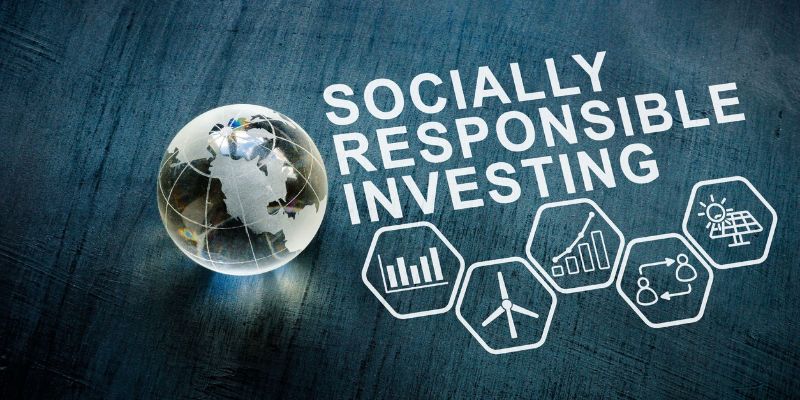What Is a Socially Responsible Investment (SRI)?
Jul 30, 2023 By Rick Novak
Have you been curious about socially responsible investments (SRI) and what they entail? In today's modern world, the idea of investing in a way that can make a positive impact on society is gaining popularity.
But what does it mean to be a socially responsible investor? With so many organizations and initiatives with varying definitions of SRI, it might feel overwhelming for someone new to leap into this form of investing.
Nevertheless, understanding the basics behind SRI could be incredibly beneficial and empowering for those eager to make their hard-earned money work for bigger causes than themselves.
This blog post will overview SRI principles and highlight some organizations worth considering when starting your journey – from ethical investment companies to charitable funds.
What Is a Socially Responsible Investment

Socially responsible investments (SRI) are a form of investing that emphasizes considering the interests of society and the environment when making decisions. SRI is also known as ethical investing, green investing, or socially conscious investing.
It typically excludes weapons manufacturing, tobacco, gambling, and pornography to minimize negative impacts on society.
SRI is an investment strategy considering how a company or organization's policies could affect profits and social responsibility initiatives like human rights, labor relations issues, environmental sustainability efforts, and other corporate objectives.
SRI aims to invest with companies whose practices positively impact both the world and their investors' portfolios.
Socially responsible investments come in many forms, such as mutual funds and exchange-traded funds (ETFs). They are often screened for companies that meet certain standards or criteria related to SRI.
Other investment options, such as impact investments, are also available, focusing on creating positive social or environmental change with every dollar invested.
Ultimately, socially responsible investing allows investors to use their money in a way that aligns with their values and beliefs while still achieving strong financial returns.
Investing in companies making ethical decisions can help improve the world without sacrificing your financial goals. It's an opportunity to make both personal and global gains through the power of investment.
Understanding Socially Responsible Investment (SRI)

Socially responsible investment (SRI) has become increasingly popular as more investors
look for ways to make their money work for financial and social gains.
SRI is rooted in conscious capitalism, which involves avoiding investments in companies that promote or sell harmful substances such as alcohol, tobacco, and gambling. Instead, investors seek companies working towards social justice, environmental sustainability, and clean technology initiatives.
Mutual funds and ETFs provide a convenient way for retail investors to access SRI options with just one investment. It's important to read through the fund prospectus carefully, though, as this will provide an understanding of the philosophies used by fund managers when selecting investments.
Investors need to also assess the financial outlook of an investment, irrespective of its social value.
Investors can also make direct investments in companies involved with SRI initiatives. This could include investing in clean energy companies or working towards global sustainability goals.
While this could be a riskier approach as it is not diversified, it may still be a viable option for some investors keen to support specific causes or organizations while still seeking returns on their investment.
Overall, understanding socially responsible investments is important for any investor looking to make money and do good at the same time. With the right research and assessment of opportunities available, conscious capitalists can be sure they're making informed investments that have the potential to yield both financial and social gains.
Special Considerations
Investors interested in socially responsible investing should consider several important points before making decisions.
Risk Assessment
When it comes to investing, risk is an unavoidable factor. With SRI, investors must be aware of the inherent risks associated with all investments and those unique to socially responsible investments.
For example, since many SRI funds and products invest in a mix of socially-conscious companies and organizations, these funds have greater exposure to potential stock market volatility than traditional index funds or low-risk investments.
Additionally, as previously mentioned, some SRI portfolios may involve companies that fail to live up to their social mission, which could lead to financial losses if not managed properly.
Fees
Funds focusing on SRI often have higher fees than traditional funds due to the additional research and analysis required for responsible investing. Additionally, certain SRI products, such as Green Bonds or Impact Investing, may require investors to pay a premium to invest in them. Investors should understand all of the associated fees before making any commitments.
Research
Investors must research when deciding which SRI product is right for them. Many companies offer various socially responsible investments, and it's up to the investor to decide which one best fits their needs. Additionally, investors should be aware of any additional restrictions or guidelines imposed by the company they invest with.
Investors should consider all associated costs and risks and do their research before committing to an investment product. By doing so, they will have a greater chance of achieving their desired financial goals while making an impact with their money.
Example of Socially Responsible Investing
An example of socially responsible investing is impact investing. This form of SRI focuses on investing for positive social and environmental benefits while generating financial returns. Impact investments can range from microfinance lending to renewable energy companies as long as it has an explicit purpose of helping people or the environment.
These investments may be riskier than traditional investments, but they provide investors with financial and non-financial returns, such as increased awareness or satisfaction that their money is being used for good. Ultimately, impact investing allows individuals to make a positive difference in the world through their investments.
Where Can Socially Responsible Investments Be Made
Socially responsible investments (SRI) are not limited to just stocks. There are a variety of investment options and products that can be used to make an impact.
These include stocks, bonds, mutual funds, ETFs, or alternative investments such as real estate. These could be suitable depending on the individual's risk tolerance, purpose for investing, and financial goals.
Additionally, many banks offer special accounts that prioritize ethical investments. This could be a great option for someone looking to get started with socially responsible investing without the need for professional advice or guidance.
With these accounts, investors will benefit from having their money automatically invested in socially responsible investments instead of selecting each security themselves.
Which Are Among the Top Socially Responsible Bond
ETFs
One of the most popular SRI options is socially responsible bond exchange-traded funds (ETFs). These ETFs focus on bonds, debt investments that pay out fixed interest rates throughout their life span. Investing in these bond ETFs gives you a steady income stream while doing something good for the world.
Among the top socially responsible bond ETFs are BlackRock's iShares ESG USD Corporate Bond ETF (ESGC), Vanguard FTSE Social Index Fund (VFTSX), SPDR Barclays Sustainable Bond ETF (SUSB), Goldman Sachs Access Investing ESG U.S. Aggregate Bond ETF (GESB) and PIMCO Total Return ESG Exchange-Traded Fund (TRETX).
FAQs
What does SRI mean in ESG?
SRI stands for socially responsible investing, a form of investing that creates positive social and environmental impact. It's also known as ESG (environmental, social, and governance) investing because it focuses on identifying companies with strong performance in these three areas.
What are the benefits of SRI?
The main benefit of SRI is that investors can make money while doing good. This allows them to align their values with their investments and contribute to society in a meaningful way. Additionally, more companies are becoming aware of their environmental and social responsibility, increasing opportunities for SRI investors to realize investment returns.
Who uses SRI?
SRI is becoming increasingly popular and can be used by individual and institutional investors. SRI offers a great way for investors to make an impact without sacrificing their financial goals.
Conclusion
Socially responsible investing (SRI) is a powerful tool that allows conscious capitalists to financially support organizations and initiatives that create positive change in society and the environment. Understanding the risks and potential rewards of SRI before investing is important. Additionally, it is important to research and select an SRI product that best suits your needs and financial goals. By doing so, individuals can make a lasting impact on the world with their investments.








